Business Process Management for Small Business
WORK LESS, GET MORE DONE
FREE YOUR MIND AND TIME TODAY
We provide business solutions to local businesses
to help them grow & operate efficiently.
CAN YOUR BUSINESS RUN WITHOUT YOU?

Using business process automation, businesses can streamline and automate their manual processes., while still responding to leads, onboarding clients, collecting payments all without:
Needing a large team
Trying to figure it out yourself
Breaking the bank
Every Business Has A System Situation Let us Help You With Yours.
Consultation Services
FRACTIONAL SYSTEMS CONSULTANT

Get top tier systems expertise without a full-time hire. As your Fractional Systems Consultant, I'll work directly with your team to streamline operations, optimize technology, and align your business goals for sustainable growth.
SYSTEMS AUDIT

Let's get your business running like a well-oiled machine. Our Systems Audit digs deep into your operations, finding the kinks and we will provide you with a detailed implementation plan on how to smooth them out, complete with actionable recommendations.
SYSTEMS IN 7 DAYS

Are you over it and want someone to just do it? Your wish is our command. Systems in 7 Days is a complete, done-for-you setup of funnels, automations, workflows, and backend systems. Get a streamlined business headquarters—centralized, simplified, and ready to scale.
Why Choose Us as Your Business System Consultant?
We specialize in helping service-based businesses like yours overcome stagnant growth and reach increased productivity. By closely examining your unique business needs, we create customized business process improvement solutions that not only drive results today but also set you up for sustained success in the future.
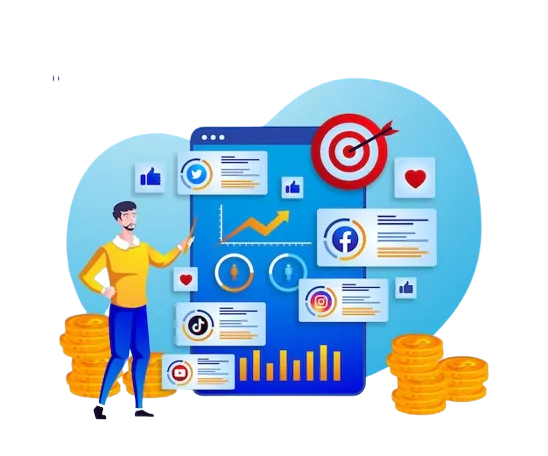
We Streamline Your Business With Our customized strategies
The Profitable Systems Blueprint is the plan we use to help small businesses run smoother, get more done, and save time, money, and headaches. We do this using our signature methodologies and technologies.
Strategic Development
Process Design
Automation Implementation
TRANSFORM YOUR BUSINESS WITH EFFICIENT SYSTEMS & PROCESSES FOR GROWTH, FREEDOM AND PEACE OF MIND
Say goodbye to burnout and hello to streamlined operations, increased revenue, and the freedom to focus on what matters most.
The roadmap we use to ensure your business' success:
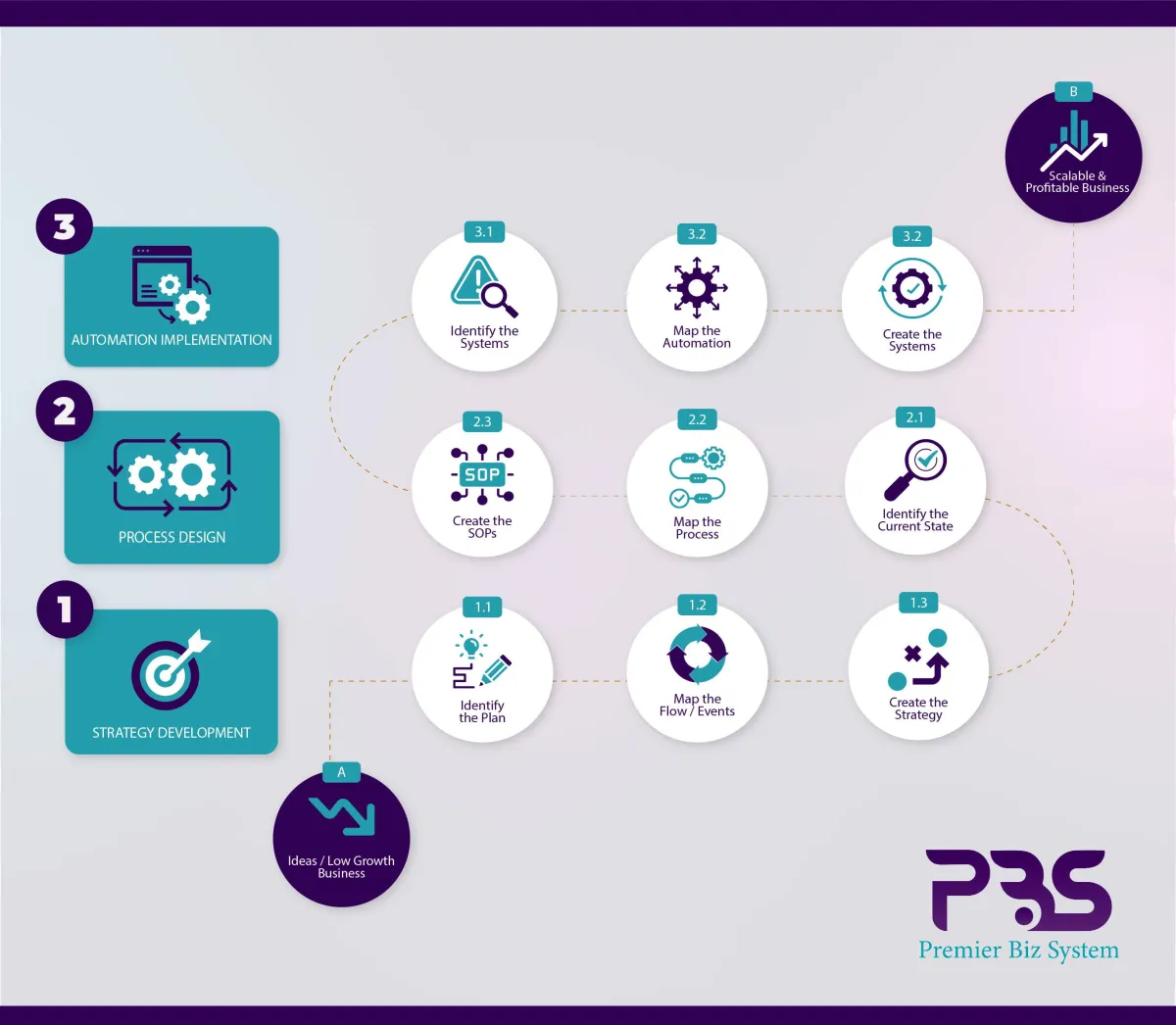


Reach Marketing
We'll help you find new customers and expand your audience by harnessing the power of email and text marketing. Say goodbye to spending tons on ads - these strategies work wonders on their own! >> Learn More
Reputation Marketing
Your reputation is everything. We'll show you how to build a stellar online presence that will draw in new clients and keep them loyal. >> Learn More

Resell Marketing
Maximize your profits by encouraging existing customers to buy again. Our innovative techniques will keep them coming back for more, boosting your revenue without breaking the bank. >> Learn More

Retargeting Marketing
Don't let potential customers slip through the cracks! Our retargeting strategies will help you re-engage those who showed interest but didn't convert, turning them into happy, paying customers. >> Learn More
Our Team

John Doe

Jane Doe

John Doe
Systems, Processes and Automation are all about STRATEGY First! That is our #1 Methodology.
80% Strategy and 20%Tool
~Jenifer Jay
Frequently Asked Questions
What Is a Business System Consultant
A Business Systems Consultant is a professional who helps businesses streamline their operations, improve productivity, and achieve their goals by designing and implementing effective systems & processes. Think of it as having a strategic partner who ensures every part of your business works together seamlessly saving you time, money, and stress.
At Premier Business Systems, our role as Business Systems Consultants is to:
Analyze Your Current Operations: We identify inefficiencies and uncover opportunities to improve how your business runs.
Design Custom Solutions: Using our Profitable Systems Blueprint, we create strategies that align with your goals and business model.
Implement Automation and Processes: From capturing leads to retaining loyal customers, Internal team communication and productivity we implement tools and systems that help your business work smarter, not harder. (yes it not just a cliche statement)
Provide Ongoing Support: We guide you every step of the way to ensure your systems continue to deliver results as your business grows.Whether you’re overwhelmed by juggling tasks, missing out on leads, or struggling with inefficiencies, a Business Systems Consultant can transform the way you operate giving you more time to focus on what matters most.
Ready to get started? Book Your Systems Audit Today
Who is this service for?
Our services are designed for service-based businesses of all sizes, from small startups to established companies, looking to save time, reduce stress, and scale efficiently.
-This service is for business owners who are tired of being stuck at stagnant growth.
-Businesses who are profitable but unorganized.
-Businesses missing out on opportunities from not following up.
-Businesses who have software in place but it is inefficient.
You can get started by choosing which service works for you.
Do you provide ongoing support after implementation?
Yes! We offer ongoing consulting and support to ensure your systems continue to operate effectively and adapt as your business grows.
Is there a minimum contract or commitment?
Some services, like the Systems Audit or Systems in 7 Days, are project-based with no ongoing commitment. For Fractional Systems Consulting, in an effort to get the most impact our minimum contractual commitment is six months.
How will these services help my business grow?
In our experience we find that most businesses are losing money because of operational bottlenecks. Once those bottlenecks are removed it will open the business to receive more opportunities and availability to increase the businesses revenue.
What tools and platforms do you work with?
We work with a variety of tools and platforms, including CRM systems, marketing automation tools, and communication platforms. We’ll recommend and integrate the best solutions for your needs.
Will I need to purchase additional software?
We will not know the answer to this until we perform a systems audit. Once we provide you with your audit report you will know what options you have. You will also have a complete implementation plan.
Are you looking to hire someone to create automations in your business?
Grab our guide on How To Hire an Automation Specialist.
Educate your self before you book that appointment.
Do you want more leads in your business but not sure how to get them?
Grab our Lead Generation Playbook.
Get actual strategies you can implement today!
Save Yourself From Burnout.
There are tasks you can automate.
Grab our 30 Tasks You Can Automate Guide.
Get actual strategies you can implement today!
Blog & Articles

The Difference Between a Website and a Landing Page.
Introduction:
When it comes to marketing your business online, having a well-designed website is essential. But if you want to generate leads and make sales, you'll also need a landing page. In this post, we'll explain the difference between a website and a landing page, and show you how to create an effective landing page that will help you achieve your business goals.
If you're running a business, it's important to have a strong online presence. One way to do this is by having a website. A website is a collection of web pages that provides information about your business. Your website can include your company history, contact information, and product or service offerings.
While having a website is important, you may also want to consider creating a landing page. A landing page is a specific web page that's designed to convert visitors into leads or customers. Landing pages are often used in online advertising campaigns, and they typically include a call-to-action (CTA) that encourages the visitor to take a specific action, such as making a purchase or signing up for a newsletter.

The difference between a website and landing page
The key difference between a website and a landing page is that a website is designed to provide general information about a business, while a landing page is designed to promote ONE specific product or service.
If you're running an online advertising campaign, you may want to create a landing page to increase your conversion rate. But even if you're not running a campaign, a landing page can be a valuable tool for driving conversions.
When designing a landing page, there are a few key things to keep in mind. First, your landing page should be focused on a single conversion goal. Don't try to include too much information or you'll risk overwhelming your visitors. Second, make sure your CTA is clear and prominent. You want visitors to know exactly what you want them to do when they land on your page.
If you're not sure which one you need, ask yourself this question: what is the primary purpose of your website? If it's to provide general information about your business, then you likely just need a website. But if you're looking to promote a specific product or service, then you'll need a landing page.

What is a website?
If you're running a business, it's important to have a strong online presence. One way to do this is by having a website. A website is a collection of web pages that provides information about your business. Your website can include your company history, contact information, and product or service offerings.
The key difference between a website and a landing page is that a website is designed to provide general information about a business, while a landing page is designed to promote a specific product or service.
For example, a website might include pages that provide an overview of the business, information about products and services, a blog, and contact information. A landing page, on the other hand, would focus on a particular product or service and include a call-to-action for the visitor to learn more or make a purchase.
While a website is typically navigated by clicking on links, a landing page is designed to be the entry point for a website, and as such, it is often the first page that a visitor will see. Landing pages are usually distinct from the rest of a website in terms of design and are often created with a specific conversion goal in mind.
If you're not sure which one you need, ask yourself this question: what is the primary purpose of your website? If it's to provide general information about your business, then you likely just need a website. But if you're looking to promote a specific product or service, then you'll need a landing page.
What is a landing page?
A landing page is a specific web page that's designed to convert visitors into leads or customers. Landing pages are often used in online advertising campaigns, and they typically include a call-to-action (CTA) that encourages the visitor to take a specific action, such as making a purchase or signing up for a newsletter.
So, what's the difference between a website and a landing page? A website is designed to provide general information about a business, while a landing page is designed to promote a specific product or service. If you're running an online advertising campaign, you may want to create a landing page to increase your conversion rate. But even if you're not running a campaign, a landing page can be a valuable tool for driving conversions.
Do you have a website for your business? Have you considered creating a landing page?
When should I use a landing page?
There are several situations when you might want to use a landing page. For example, if you're running an online advertising campaign, you'll likely want to create a landing page that's specific to the offer you're promoting. This ensures that people who click on your ad are taken to a page that's relevant to what they're interested in.

Landing pages from thepremierva
You might also want to create a landing page if you're selling a product or service online. A well-designed landing page can increase your conversion rate by making it easy for visitors to find the information they need and take the action you want them to take.
Finally, if you have a website but you're not driving any traffic to it, a landing page can be a good way to start getting some visibility for your site. By creating a targeted and effective landing page, you can start generating leads and sales even if you don't have a lot of traffic.
If you're not sure whether a landing page is right for you, ask yourself this question: what's the primary purpose of my website? If it's to provide general information about your business, then a website is probably all you need. But if you're looking to promote a specific product or service, then a landing page can be a valuable tool for driving conversions.
What are the benefits of using a landing page?
There are several benefits of using a landing page, including:
🟣 Increased conversion rate: A well-designed landing page can increase your conversion rate by making it easy for visitors to find the information they need and take the action you want them to take.
🟣 More targeted traffic: Landing pages are often used in online advertising campaigns, and they can help you to generate more targeted traffic by sending people to a page that's relevant to their interests.
🟣 Greater visibility for your website: If you have a website but you're not driving any traffic to it, a landing page can be a good way to start getting some visibility for your site.
Overall, landing pages can be a valuable tool for increasing conversions and generating leads. If you're not sure whether a landing page is right for you, ask yourself this question: what's the primary purpose of my website? If it's to provide general information about your business, then a website is probably all you need. But if you're looking to promote a specific product or service, then a landing page can be a valuable tool for driving conversions.
How do I create a landing page?
Creating a landing page is relatively simple and can be done using any page builder platform. However, there are some key elements that all effective landing pages share, including:
- A headline that clearly states what the offer is
- A form that allows visitors to sign up or request more information
- Images or videos that help to explain the offer
- A call-to-action (CTA) that encourages the visitor to take action
If you're not sure how to get started,we can provide you with the software to house your landing pages and websites.

How to create an effective landing page.
Creating an effective landing page can be the key to success for your online business. A landing page is a specific web page that's designed to convert visitors into leads or customers. Landing pages are often used in online advertising campaigns, and they typically include a call-to-action (CTA) that encourages the visitor to take a specific action, such as making a purchase or signing up for a newsletter.
There are a few key things to keep in mind when creating a landing page:
1. Keep it focused on a single conversion goal.
2. Make sure your CTA is clear and prominent.
3. Use images and videos to break up the text and add visual interest.
4. Use persuasive language to encourage visitors to take action.
5. Include social proof to build trust and credibility.
follow these tips, you can create an effective landing page that will help you achieve your online business goals.
When you layout your landing page make sure to take into account the mobile view and your page is optimized (mobile friendly) for mobile.
Make sure your first call to action button is what we call "above the fold" meaning its the first thing that people see in addition to your headline so they do not have to scroll to find how to take action.
The most essential component is do not put ANYTHING else on this page that will take them anywhere else but to the check out or registration (optin). This is not the time to ask people to follow you or subscribe to your podcast. You can put those things on the thank you page.
Conclusion
So, what's the difference between a website and a landing page? A website is designed to provide general information about a business, while a landing page is designed to promote a specific product or service. If you're running an online advertising campaign, you may want to create a landing page to increase your conversion rate. But even if you're not running a campaign, a landing page can be a valuable tool for driving conversions.
Do you have a website for your business? Have you considered creating a landing page?
Still have questions about the difference between a website and a landing page? Leave a comment below and we'll be happy to help!

RESOURCES
Vote for us please: The #BestOfGwinnett awards showcase businesses working hard to take care of their customers and community. Premier Business Systems, LLC is excited to have been nominated in the Business Consulting Firms Category! Vote at:
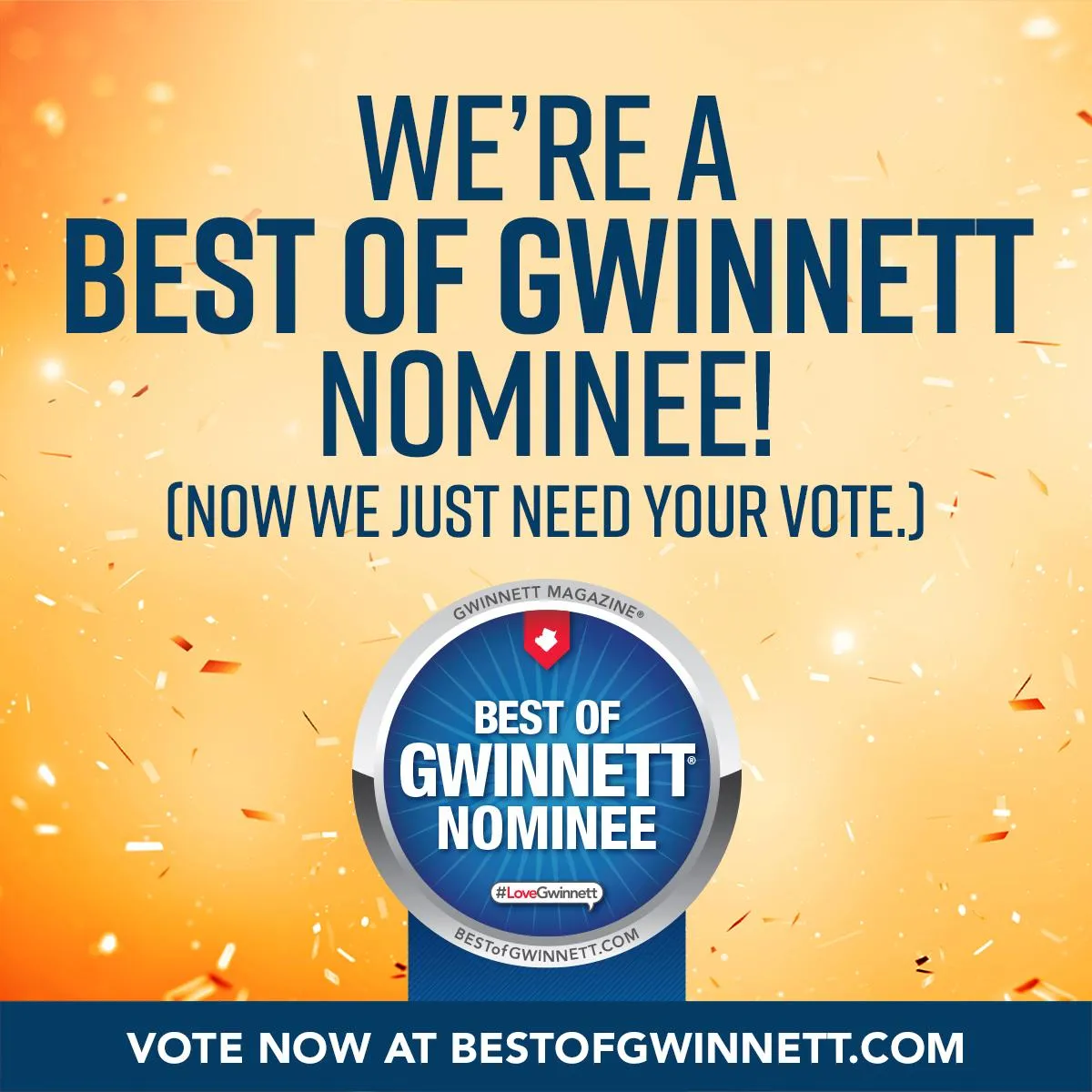
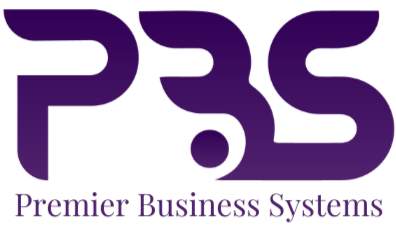



Facebook
Instagram
LinkedIn
Youtube
TikTok